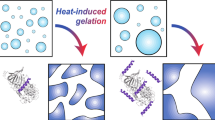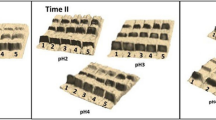Abstract
DURING work on the heat denaturation of ovalbumin at pH 3, it was found, from measurements of the changes in solubility and in the amount of aggregated protein observed in the ultracentrifuge, that the ovalbumin behaved as a mixture of two proteins with different rates of denaturation. This was confirmed by heating an ovalbumin solution until about 80 per cent of the protein had become insoluble at the isoelectric point, removing the denatured protein and measuring the rate of solubility loss of the remaining protein at pH 3. This was found to be less than a quarter of the rate of denaturation of whole ovalbumin.
This is a preview of subscription content, access via your institution
Access options
Subscribe to this journal
Receive 51 print issues and online access
$199.00 per year
only $3.90 per issue
Buy this article
- Purchase on Springer Link
- Instant access to full article PDF
Prices may be subject to local taxes which are calculated during checkout
Similar content being viewed by others
References
Creeth, J. M., Nichol, L. W., and Winzor, D. J., J. Phys. Chem., 62, 1546 (1958).
Huggins, C., Tapley, D. F., and Jensen, E. V., Nature, 167, 592 (1951).
Author information
Authors and Affiliations
Rights and permissions
About this article
Cite this article
SMITH, M., BACK, J. Modification of Ovalbumin in Stored Eggs detected by Heat Denaturation. Nature 193, 878–879 (1962). https://doi.org/10.1038/193878a0
Issue Date:
DOI: https://doi.org/10.1038/193878a0
This article is cited by
-
A Simple Model for Understanding the Origin of the Amide Proton Transfer MRI Signal in Tissue
Applied Magnetic Resonance (2012)
-
A Reaction between Glucose and Egg White Proteins in Incubated Eggs
Nature (1964)
Comments
By submitting a comment you agree to abide by our Terms and Community Guidelines. If you find something abusive or that does not comply with our terms or guidelines please flag it as inappropriate.



